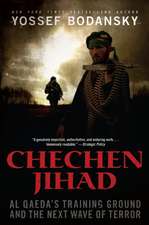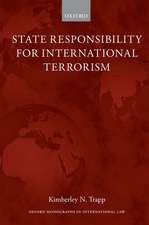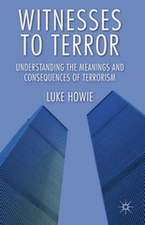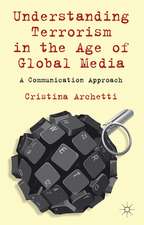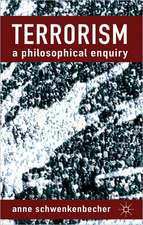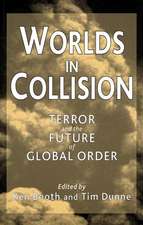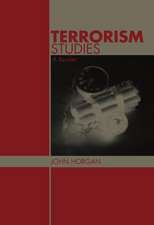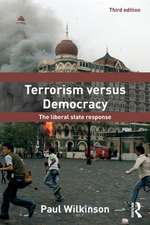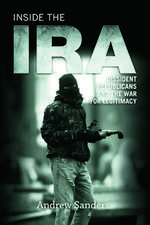Liberal Internationalism: The Interwar Movement for Peace in Britain: Rethinking Peace and Conflict Studies
Autor M. Pughen Limba Engleză Hardback – 28 sep 2012
| Toate formatele și edițiile | Preț | Express |
|---|---|---|
| Paperback (1) | 384.48 lei 6-8 săpt. | |
| Palgrave Macmillan UK – 2012 | 384.48 lei 6-8 săpt. | |
| Hardback (1) | 390.63 lei 6-8 săpt. | |
| Palgrave Macmillan UK – 28 sep 2012 | 390.63 lei 6-8 săpt. |
Din seria Rethinking Peace and Conflict Studies
-
 Preț: 113.00 lei
Preț: 113.00 lei - 20%
 Preț: 565.31 lei
Preț: 565.31 lei -
 Preț: 318.69 lei
Preț: 318.69 lei -
 Preț: 357.93 lei
Preț: 357.93 lei -
 Preț: 272.92 lei
Preț: 272.92 lei -
 Preț: 387.20 lei
Preț: 387.20 lei - 15%
 Preț: 574.77 lei
Preț: 574.77 lei - 15%
 Preț: 699.45 lei
Preț: 699.45 lei - 15%
 Preț: 646.62 lei
Preț: 646.62 lei - 15%
 Preț: 639.25 lei
Preț: 639.25 lei - 15%
 Preț: 644.30 lei
Preț: 644.30 lei -
 Preț: 390.63 lei
Preț: 390.63 lei - 15%
 Preț: 644.95 lei
Preț: 644.95 lei -
 Preț: 392.21 lei
Preț: 392.21 lei -
 Preț: 384.86 lei
Preț: 384.86 lei -
 Preț: 387.58 lei
Preț: 387.58 lei -
 Preț: 386.99 lei
Preț: 386.99 lei -
 Preț: 385.84 lei
Preț: 385.84 lei -
 Preț: 388.72 lei
Preț: 388.72 lei -
 Preț: 390.63 lei
Preț: 390.63 lei -
 Preț: 389.49 lei
Preț: 389.49 lei -
 Preț: 391.61 lei
Preț: 391.61 lei -
 Preț: 390.63 lei
Preț: 390.63 lei -
 Preț: 391.61 lei
Preț: 391.61 lei -
 Preț: 389.88 lei
Preț: 389.88 lei -
 Preț: 386.39 lei
Preț: 386.39 lei -
 Preț: 426.56 lei
Preț: 426.56 lei -
 Preț: 389.88 lei
Preț: 389.88 lei -
 Preț: 389.88 lei
Preț: 389.88 lei -
 Preț: 417.14 lei
Preț: 417.14 lei - 15%
 Preț: 699.93 lei
Preț: 699.93 lei -
 Preț: 392.60 lei
Preț: 392.60 lei -
 Preț: 390.63 lei
Preț: 390.63 lei -
 Preț: 389.11 lei
Preț: 389.11 lei - 18%
 Preț: 783.25 lei
Preț: 783.25 lei -
 Preț: 392.60 lei
Preț: 392.60 lei -
 Preț: 388.72 lei
Preț: 388.72 lei -
 Preț: 388.72 lei
Preț: 388.72 lei -
 Preț: 388.52 lei
Preț: 388.52 lei
Preț: 390.63 lei
Nou
Puncte Express: 586
Preț estimativ în valută:
74.75€ • 78.04$ • 61.86£
74.75€ • 78.04$ • 61.86£
Carte tipărită la comandă
Livrare economică 05-19 aprilie
Preluare comenzi: 021 569.72.76
Specificații
ISBN-13: 9780230537637
ISBN-10: 0230537634
Pagini: 244
Ilustrații: XI, 244 p.
Dimensiuni: 140 x 216 x 20 mm
Greutate: 0.48 kg
Ediția:2012
Editura: Palgrave Macmillan UK
Colecția Palgrave Macmillan
Seria Rethinking Peace and Conflict Studies
Locul publicării:London, United Kingdom
ISBN-10: 0230537634
Pagini: 244
Ilustrații: XI, 244 p.
Dimensiuni: 140 x 216 x 20 mm
Greutate: 0.48 kg
Ediția:2012
Editura: Palgrave Macmillan UK
Colecția Palgrave Macmillan
Seria Rethinking Peace and Conflict Studies
Locul publicării:London, United Kingdom
Cuprins
Preface Introduction: Liberal Internationalism, a Social Movement for Peace Governance: Ideological and Political Trespass Education: Democratic Accountability and Paper Guarantees Disarmament: White Robes of Peace or Jackboots and Spurs? Innovation: Arming the League with Air Power Resistance: Pacifism and the Power of Defiance Imperialism: Economic Security and Sanctions Revisionism: Rearmament and Peaceful Change Conclusion: Retrenchment, Reform and Colonisation Appendix I: Group Memberships Appendix II: Circulation Figures
Recenzii
"In this excellent book, Pugh very clearly establishes the role and significance of social and political movements in the development of foreign and defence policy [...] I commend this book to all who want to understand why peace movements
and other social movements for progressive social change are important." - International Peacekeeping
'With impeccable scholarship, Michael Pugh offers novel insights into interwar liberal internationalism in Britain. Erudite and authoritative, this account will rightly become an indispensable point of reference for students and scholars alike.'
- Richard Caplan, Professor of International Relations, University of Oxford, UK
'This is an important and erudite book. The 1930s are often seen as a 'lost decade' in
which appeasement led inevitably to the Second World War. Michael Pugh's careful
reading of the period reveals a much more complex story in which peace movements
had considerable success in laying down the foundations of what would later become
the rationale for international peace-support interventions and collective security.
This work is a useful antidote to many of the a-historical books on international
relations that assume the world began in 1989.'
Roger Mac Ginty, Professor of Peace and Conflict Studies, University of Manchester, UK
'Michael Pugh has produced a compelling, thought-provoking and highly readable assessment of the importance and lasting impact of interwar 'liberal internationalism' as a 'complex movement at once humane and superior, tolerant and dogmatic, universalistic and imperial'. While many of its leading intellectual proponents were later denigrated as hopelessly 'naïve' and 'idealistic', Pugh reveals a movement not only with a strong ethical dimension but one capable of 'pragmatic adaption to changes in international and domestic circumstances'. Above all, this is a study of liberal internationalism as an influential, if diverse and complex, social movement for peace. As such, and as Pugh persuasively shows, any assessment of its true impact and influence requires a longer-term historical perspective, one that extends well beyond the interwar period itself.'
- Mats Berdal, King's College London, UK
and other social movements for progressive social change are important." - International Peacekeeping
'With impeccable scholarship, Michael Pugh offers novel insights into interwar liberal internationalism in Britain. Erudite and authoritative, this account will rightly become an indispensable point of reference for students and scholars alike.'
- Richard Caplan, Professor of International Relations, University of Oxford, UK
'This is an important and erudite book. The 1930s are often seen as a 'lost decade' in
which appeasement led inevitably to the Second World War. Michael Pugh's careful
reading of the period reveals a much more complex story in which peace movements
had considerable success in laying down the foundations of what would later become
the rationale for international peace-support interventions and collective security.
This work is a useful antidote to many of the a-historical books on international
relations that assume the world began in 1989.'
Roger Mac Ginty, Professor of Peace and Conflict Studies, University of Manchester, UK
'Michael Pugh has produced a compelling, thought-provoking and highly readable assessment of the importance and lasting impact of interwar 'liberal internationalism' as a 'complex movement at once humane and superior, tolerant and dogmatic, universalistic and imperial'. While many of its leading intellectual proponents were later denigrated as hopelessly 'naïve' and 'idealistic', Pugh reveals a movement not only with a strong ethical dimension but one capable of 'pragmatic adaption to changes in international and domestic circumstances'. Above all, this is a study of liberal internationalism as an influential, if diverse and complex, social movement for peace. As such, and as Pugh persuasively shows, any assessment of its true impact and influence requires a longer-term historical perspective, one that extends well beyond the interwar period itself.'
- Mats Berdal, King's College London, UK
Notă biografică
MICHAEL PUGH is Professor of Peace and Conflict Studies, University of Bradford, UK, Leverhulme Emeritus Fellow (2011-12) and editor of the journal International Peacekeeping. He has written extensively on peace and conflict and is the co-editor, with Neil Cooper and Mandy Turner, of Whose Peace? Critical Perspectives on the Political Economy of Peacebuilding (Palgrave Macmillan, 2008).

